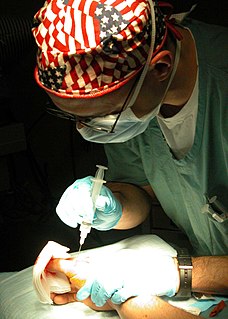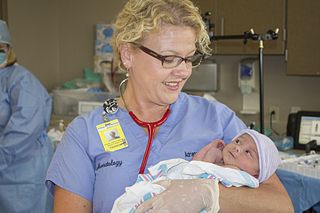
Certified Registered Nurse Anesthetist (CRNA) is a qualification in the United States for advanced practiced registered nurses with a Doctorate or Master's degree specializing in the administration of anesthesia. CRNAs account for approximately half of the anesthesia providers in the United States and are the main providers of anesthesia in rural America, administering approximately 43 million anesthetics to patients each year. Historically, nurse anesthetists have been providing anesthesia care to patients since the American Civil War more than 150 years ago. The CRNA credential came into existence in 1956 and approximately 40% of nurse anesthetists are male.
A terminal degree is a university degree that can signify one of two outcomes. In some cases, it is the highest degree that can be awarded in a specific academic or professional track. In other cases, it is a degree that is awarded when a candidate completes a certain amount of coursework but does not go on to doctoral work. Some students enroll in a terminal Master's program with the goal of preparing to enter a PhD program. For certain professions and research grants it means the lowest degree to be considered qualified.
Nursing credentials and certifications are the various credentials and certifications that a person must have to practice nursing legally. Nurses' postnominal letters reflect their credentials—that is, their achievements in nursing education, licensure, certification, and fellowship. The letters usually appear in the following order:
A clinical nurse specialist (CNS) is an advanced practice nurse who can provide expert advice related to specific conditions or treatment pathways. According to the International Council of Nurses (ICN), an Advanced Practice Nurse is a registered nurse who has acquired the expert knowledge base, complex decision-making skills and clinical competencies for expanded practice, the characteristics of which are shaped by the context and/or country in which s/he is credentialed to practice. Clinical Nurse Specialists are registered nurses, who have graduate level nursing preparation at the master's or doctoral level as a CNS. They are clinical experts in evidence-based nursing practice within a specialty area, treating and managing the health concerns of patients and populations. The CNS specialty may be focused on individuals, populations, settings, type of care, type of problem, or diagnostic systems subspecialty. CNSs practice autonomously and integrate knowledge of disease and medical treatments into the assessment, diagnosis, and treatment of patients' illnesses. These nurses design, implement, and evaluate both patient–specific and population-based programs of care. CNSs provide leadership in the advanced practice of nursing to achieve quality and cost-effective patient outcomes as well as provide leadership of multidisciplinary groups in designing and implementing innovative alternative solutions that address system problems and/or patient care issues. In many jurisdictions, CNSs, as direct care providers, perform comprehensive health assessments, develop differential diagnoses, and may have prescriptive authority. Prescriptive authority allows them to provide pharmacologic and nonpharmacologic treatments and order diagnostic and laboratory tests in addressing and managing specialty health problems of patients and populations. CNSs serve as patient advocates, consultants, and researchers in various settings [American Nurses Association (ANA) Scope and Standards of Practice (2004), p. 15].
In the United States, a Psychiatric-mental health nurse practitioner (PMHNP) is an advanced practice registered nurse trained to provide a wide range of mental health services to patients and families in a variety of settings. PMHNPs diagnose, conduct therapy, and prescribe medications for patients who have psychiatric disorders, medical organic brain disorders or substance abuse problems. They are licensed to provide emergency psychiatric services, psychosocial and physical assessment of their patients, treatment plans, and manage patient care. They may also serve as consultants or as educators for families and staff. The PMHNP has a focus on psychiatric diagnosis, including the differential diagnosis of medical disorders with psychiatric symptoms, and on medication treatment for psychiatric disorders.
In the United States, anesthesia can be administered by physician anesthesiologists, anesthesiologist assistants or nurse anesthetists
The University of San Francisco School of Nursing and Health Professions (SNAHP) is the nursing school of the private University of San Francisco, located in San Francisco, California. First established in 1954, the school has approximately 1,300 students.
A pediatric nurse practitioner (PNP) is a nurse practitioner that specializes in care to newborns, infants, toddlers, pre-schoolers, school-aged children, adolescents, and young adults. The pediatric nurse practitioner is a specialist in the care of children from birth through young adult with an in-depth knowledge and experience in pediatric primary health care including well child care and prevention/management of common pediatric acute illnesses and chronic conditions. This care is provided to support optimal health of children within the context of their family, community, and environmental setting.
The Consensus Model for APRN Regulation is a model and document created by the National Council of State Boards of Nursing to create consensus on licensure, accreditation, certification, and education for advanced practice registered nurses (APRNs).

A neonatal nurse practitioner (NNP) is an advanced practice registered nurse (APRN) with at least 2 years experience as a beside registered nurse in a level III NICU, who is prepared to practice across the continuum, providing primary, acute, chronic, and critical care to neonates, infants, and toddlers through age 2. Primarily working in neonatal intensive care unit (NICU) settings, NNPs select and perform clinically indicated advanced diagnostic and therapeutic invasive procedures. In the United States, a board certified neonatal nurse practitioner (NNP-BC) is an APRN who has acquired Graduate education at the master’s or doctoral level and has a board certification in neonatology. The National Association of Neonatal Nurse Practitioners (NANNP) is the national association that represents neonatal nurse practitioners in the United States. Certification is governed by the National Certification Corporation for Obstetrics, Gynecologic and Neonatal Nursing Specialties (NCC).
Advanced practice registered nurses (APRNs) are registered nurses with graduate degrees in nursing. APRN roles include: certified nurse midwife, clinical nurse specialist, certified registered nurse anesthetist, and nurse practitioner. APRNs assess, diagnose, manage patient medical problems, order diagnostic tests, and prescribe medications. Rules, regulations, and credentialing for APRNs vary by state. This page outlines the regulatory processes for nurse practitioners in Wisconsin, including education, certification, licensing, and credentialing. Regulatory and credentialing processes are continuously changing, and the information contained on this page is current as of November 2015.
In the United States, Nursing is the largest healthcare profession, with more than 3.1 million registered nurses. Between 2012 and 2022, employment for nurses is projected to grow by 19 percent, which is more than any other profession. Nurses make up the largest component of staff in hospitals but are also able to provide care in clinic settings, patient’s homes, schools, nursing homes, public health agencies, and mental health centers. In addition, nurses can be found in the military, in industry, nursing education, and do health care research. Nurses in these various roles and settings can provide direct patient care and case management, but also develop and establish nursing practice and quality standards within complex healthcare systems. As each degree can provide a different level of care for patients and function in vastly different roles, it is important to differentiate between them. The levels of nursing degrees have different educational requirements, licensure, and credentialing that can vary state to state.
The Acute Care Nurse Practitioner (ACNP) is a registered nurse who has completed an accredited graduate-level educational program that prepares them as a nurse practitioner. This program includes supervised clinical practice to acquire advanced knowledge, skills, and abilities. This education and training qualifies them to independently: (1) perform comprehensive health assessments; (2) order and interpret the full spectrum of diagnostic tests and procedures; (3) use a differential diagnosis to reach a medical diagnosis; and (4) order, provide, and evaluate the outcomes of interventions. The purpose of the ACNP is to provide advanced nursing care across the continuum of health care services to meet the specialized physiologic and psychological needs of patients with acute, critical, and/or complex chronic health conditions. This care is continuous and comprehensive and may be provided in any setting where the patient may be found. The ACNP is a licensed independent practitioner and may autonomously provide care. Whenever appropriate, the ACNP considers formal consultation and/or collaboration involving patients, caregivers, nurses, physicians, and other members of the interprofessional team.
Advanced Practice Registered Nurse (APRN) refers to a nurse with advanced education, typically at least a master’s degree, and certification by a national certifying program. The APRN provides specialized and multifaceted care and are able to do 60 to 80 percent of preventative and primary care done by physicians. Minnesota Statutes section 148.171, subd. 3 states that in Minnesota, APRN "means an individual licensed as a registered nurse by the board, and certified by a national nurse certification organization acceptable to the board to practice as a clinical nurse specialist, nurse anesthetist, nurse-midwife, or nurse practitioner".
The Byrdine F. Lewis College of Nursing and Health Professions contains the nursing school and school of allied health professions at Georgia State University.





